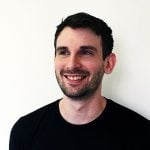Collaboration, as many MBA students quickly learn, is key in a business environment. For four Duke University Fuqua School of Business students, that collaborative effort fostered an important victory on the road to a potentially fruitful career.
Paige Swofford, Liz Arnason and Mike DeNoia, Masters of Environmental Management (MEM) and MBA dual majors, alongside Daytime MBA student Yochai Ben Haim—all first-years at Fuqua—nabbed first place at last month’s Challenges in Energy Case Competition held at the UCLA Anderson School of Management. Teamwork was essential to their victory, but their collaborative bond had formed long before the group entered the competition.
“The four of us have all been very active with the MBA Energy Club, so [we] know each other fairly well,” says DeNoia, who studied environmental management the previous year alongside Arnason and Swofford at Duke’s Nicholas School of the Environment. “The Energy Club communicates upcoming case competitions and is fairly good at helping organize teams if people are interested. The four of us had spoken to each other about it and came to the conclusion that we were all interested and could do well in the competition as a team.”
DeNoia had participated in the Fuels Institute “Future of Transportation” case competition the previous year, but the other team members were new to this kind of challenge. The team’s relative inexperience with the frenetic world of case competitions clearly did not hold the quartet back. After receiving the case, the four had three days to devise a solution to the presented issue and submit a slide deck to UCLA Anderson—and then only four days of practice for the official event.
“The case prompt asked us to recommend a market for a solar developer that wanted to pivot away from its current business,” Haim says. “We ‘boiled the ocean’—tried different approaches until Saturday morning, when we decided to follow Paige’s solution. Liz and Paige have great finance backgrounds and understanding, so they developed the financial model; Mike focused on the company’s new offering (what services, and to which customers) and I focused on how to implement our strategy.”
“Our pitch was focused on shifting the company in the case from a solar developer to an energy consulting firm,” Swofford recalls, “offering energy assessment, strategic energy planning and oversight of the implementation of renewables procurement, energy audit retrofits or other services.”
“We spent the first two days assessing the markets and the remainder of the time focusing this solution and developing our pitch,” DeNoia adds.

In terms of the competition, the four were largely in the dark about other competitors’ solutions. The final round of the competition, Swofford recalls, added a twist to the original proposal. “In the original case, we were told that the company sold manufacturing and solar assets for $85 million. In the twist, the national investment tax credit for solar was rolled back and the assets were worth $65 million, and we had to consider the impacts of the tax credit expiration on our recommended business plan.”
After it was over and the group had earned its $3,500 check (which joined them in first class on the flight home), DeNoia notes that several of the other teams had similar proposals; it was their preparation and thorough understanding of the business climate that set them apart.
“In the end, the feedback we received was that we had a good understanding of the landscape, had a well thought-out plan and presented convincingly,” DeNoia says.
One unique aspect of the group’s preparation involved improv comedy. Swofford introduced improv principles to the group’s presentation practices after taking Fuqua’s MBA elective “Business Improvisations.” That course’s instructor, Professor and Business Improvisations CEO Bob Kulhan, draws on his days at Second City in Chicago to help build a collaborative environment with students. Often in case competitions, it’s the small, unique twists that give eventual winners those all-so-important advantages. And for Swofford, Arnason, DeNoi and Haim, that collaborative environment fostered at Fuqua was just the advantage they needed.
Head over to the Duke MBA Energy Club website for more information on the club and future events.









